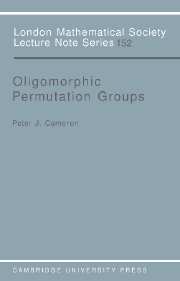5 - Miscellaneous topics
Published online by Cambridge University Press: 23 November 2009
Summary
JORDAN GROUPS
Let G be a permutation group on Ω. A Jordan set for G is a subset of Ω with the property that the pointwise stabiliser of its complement acts transitively on it. (Sets consisting of just one point satisfy this condition trivially but are usually excluded for technical reasons.) If G is n-transitive, then any set containing all but n – 1 points of Ω is a Jordan set; such Jordan sets are called improper. (This needs some care in the case when n is infinite.) Then G is called a Jordan group if it has a proper Jordan set (other than the empty set).
With the exception of some recent examples constructed by Hrushovski (to appear), the known infinite Jordan groups are of three types:
(J1) Geometric examples: These are the projective group PGL(n, k),the affine group AGL(n, k), and their close relatives. The pointwise stabiliser of any subspace of a projective or affine space acts transitively on its complement. So the complements of subspaces are the Jordan sets, and the geometry can be recovered from them. In this class, it is customary now to include also the automorphism groups of algebraically closed fields (which preserve the geometry of algebraically closed subflelds). In each of these cases, the subspaces of the geometry are precisely the algebraically closed sets (in the sense of §2.7). This fact is crucial, both in their study, and in applications.
- Type
- Chapter
- Information
- Oligomorphic Permutation Groups , pp. 117 - 144Publisher: Cambridge University PressPrint publication year: 1990



